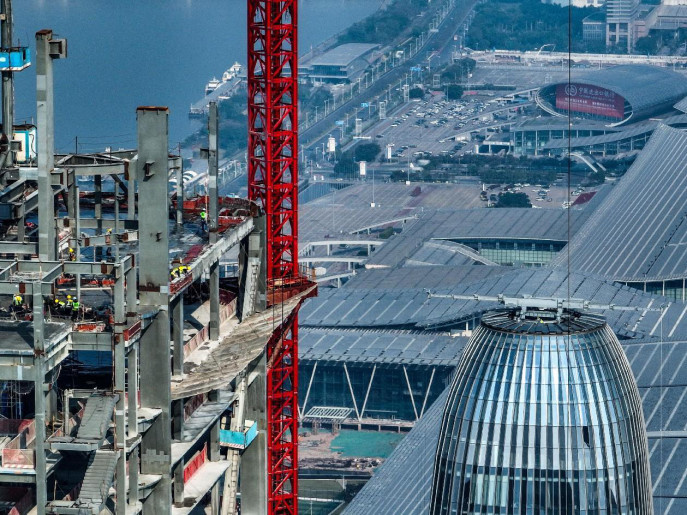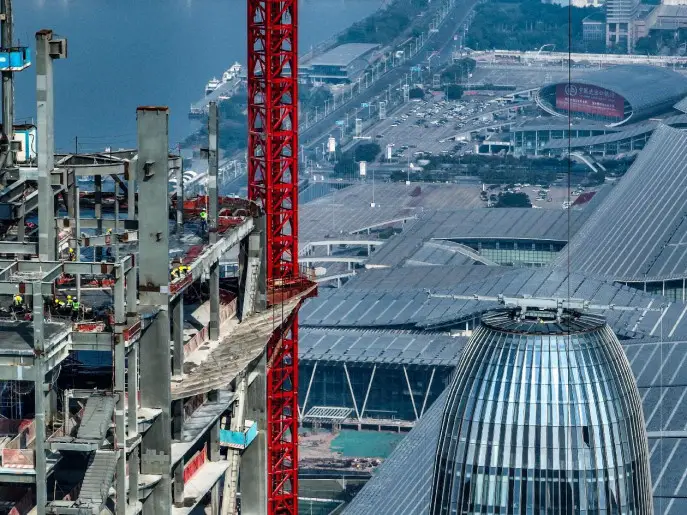By Wang Junling

Workers are busy with high-altitude construction of a building in Pazhou Artificial Intelligence and Digital Economy Pilot Zone in Guangzhou, south China's Guangdong province, Feb. 28, 2023. (Photo by Chen Zhiqiang/People's Daily Online)
China has set its gross domestic product (GDP) growth target at "around 5 percent" for 2023. The projected target has been widely reported by overseas media as soon as it was announced.
Foreign media including Reuters, Bloomberg and Cable News Network (CNN), cited analyses by authoritative international organizations and personages as saying that the target sent a positive signal for pushing the Chinese economy on an upward trajectory.
China is the largest developing country in the world. It needs to maintain long-term reasonable economic growth while improving the quality and efficiency of development. The country's target for economic growth, therefore, should be the result of careful consideration of the balance between the speed and quality of economic growth, between the vitality and order of the economy, and between the present and the future. Besides, it should be practical and feasible.
The GDP growth target of "around 5 percent" conforms to the current trends in the country's economic operation and the law of economics. It conveys China's stability and confidence in achieving high-quality development.
The target is reasonable and moderate. At the same growth rate, the larger the base in the previous year, the greater the actual growth.
In 2022, China's GDP growth reached 3 percent year on year to more than 121 trillion yuan ($17.95 trillion), with the increment standing at 6.1 trillion yuan, which is equivalent to the GDP of a medium-sized country. China's 3 percent GDP growth rate is among the highest of world's leading economies.
Therefore, by setting its GDP growth target at "around 5 percent", China tries to avoid over stimulus and excessive pursuit of high growth rate, maintain reasonable economic growth, create favorable conditions for overall planning for various tasks, including expanding employment, improving people's livelihoods, and preventing and defusing risks.
China's 31 provinces, autonomous regions and municipalities have set their growth targets for 2023, with 27 of them setting their growth target higher than the national one and 23 targeting at least 5.5 percent, which has created favorable conditions and solid a foundation for the realization of the national economic growth target.
China's GDP growth target for 2023 shows that the country pays great attention to the quality of development. High-quality development is considered the first and foremost task in the country's efforts to build a modern socialist country in all respects.
The Government Work Report delivered at the first session of the 14th National People's Congress on March 5 has provided a blueprint for the country's social and economic development in this year, setting a slew of targets concerning the quality of development, such as around 12 million new urban jobs, CPI increase of around 3 percent, growth in personal income that is generally synchronized with economic growth, continued reductions in energy consumption per unit of GDP and in the discharge of major pollutants, as well as the GDP growth target of "around 5 percent".
In fact, China's pursuit of high-quality development began long ago. As of the end of 2022, the country's number of valid invention patents exceeded 4.21 million, ranking first in the world; over the past five years, the value-added of China's high-tech manufacturing industry has grown at an average annual rate of 10.6 percent; and during the past 10 years, China's GDP has continuously reached new levels, its contribution to global economic growth has been the greatest in the world, and it has eliminated absolute poverty.
Anyone who views the matter with a historical perspective knows that although GDP growth is important, it is never China's only criterion for development.
It has become a consensus of the Chinese society that while keeping economic growth within a reasonable range, the country should put more effort into optimizing economic structure and improving the quality of its economic growth.
The country's GDP growth target of "around 5 percent" for 2023 injects confidence into the world economy. China cannot develop without the rest of the world, and the prosperity of the world needs China's effort. With a population of over 1.4 billion, China is the world's second largest economy, the largest country in manufacturing and goods trading.
During the past five years, the country's economy has expanded at an average annual rate of 5.2 percent, which is significantly higher than the world's average of around 2.3 percent in the same period.
Besides, China has the world's most complete industrial system and a domestic market with the greatest potential in the world. The country's realization of high-quality growth at a rate of "around 5 percent" will mean huge opportunities for the rest of the world.
Since the beginning of this year, foreign merchants and businesses have shown confidence in the Chinese economy with practical actions.
Moody's Investors Service has shifted its forecast for China's real GDP growth from 4 percent to 5 percent for both 2023 and 2024; German company Karcher has located its global research and development center in Suzhou city, east China's Jiangsu province, to attract outstanding talents; and Howard Schultz, founder of Starbucks, said that he is more confident than ever that the company's growth in China has just begun.
The characteristics of the Chinese economy, namely strong resilience, tremendous potential and great vitality, remain unchanged, so do the fundamentals sustaining the economy's long-term growth and the necessary production factors for high-quality development.
It can be predicted that the GDP growth rate of "around 5 percent" will still be one of the highest economic growth rates among major economies.
Sticking to its primary task of high-quality development, China will strive to achieve the goals and tasks for economic and social development this year and make more wonderful contributions to the world.
Foreign media including Reuters, Bloomberg and Cable News Network (CNN), cited analyses by authoritative international organizations and personages as saying that the target sent a positive signal for pushing the Chinese economy on an upward trajectory.
China is the largest developing country in the world. It needs to maintain long-term reasonable economic growth while improving the quality and efficiency of development. The country's target for economic growth, therefore, should be the result of careful consideration of the balance between the speed and quality of economic growth, between the vitality and order of the economy, and between the present and the future. Besides, it should be practical and feasible.
The GDP growth target of "around 5 percent" conforms to the current trends in the country's economic operation and the law of economics. It conveys China's stability and confidence in achieving high-quality development.
The target is reasonable and moderate. At the same growth rate, the larger the base in the previous year, the greater the actual growth.
In 2022, China's GDP growth reached 3 percent year on year to more than 121 trillion yuan ($17.95 trillion), with the increment standing at 6.1 trillion yuan, which is equivalent to the GDP of a medium-sized country. China's 3 percent GDP growth rate is among the highest of world's leading economies.
Therefore, by setting its GDP growth target at "around 5 percent", China tries to avoid over stimulus and excessive pursuit of high growth rate, maintain reasonable economic growth, create favorable conditions for overall planning for various tasks, including expanding employment, improving people's livelihoods, and preventing and defusing risks.
China's 31 provinces, autonomous regions and municipalities have set their growth targets for 2023, with 27 of them setting their growth target higher than the national one and 23 targeting at least 5.5 percent, which has created favorable conditions and solid a foundation for the realization of the national economic growth target.
China's GDP growth target for 2023 shows that the country pays great attention to the quality of development. High-quality development is considered the first and foremost task in the country's efforts to build a modern socialist country in all respects.
The Government Work Report delivered at the first session of the 14th National People's Congress on March 5 has provided a blueprint for the country's social and economic development in this year, setting a slew of targets concerning the quality of development, such as around 12 million new urban jobs, CPI increase of around 3 percent, growth in personal income that is generally synchronized with economic growth, continued reductions in energy consumption per unit of GDP and in the discharge of major pollutants, as well as the GDP growth target of "around 5 percent".
In fact, China's pursuit of high-quality development began long ago. As of the end of 2022, the country's number of valid invention patents exceeded 4.21 million, ranking first in the world; over the past five years, the value-added of China's high-tech manufacturing industry has grown at an average annual rate of 10.6 percent; and during the past 10 years, China's GDP has continuously reached new levels, its contribution to global economic growth has been the greatest in the world, and it has eliminated absolute poverty.
Anyone who views the matter with a historical perspective knows that although GDP growth is important, it is never China's only criterion for development.
It has become a consensus of the Chinese society that while keeping economic growth within a reasonable range, the country should put more effort into optimizing economic structure and improving the quality of its economic growth.
The country's GDP growth target of "around 5 percent" for 2023 injects confidence into the world economy. China cannot develop without the rest of the world, and the prosperity of the world needs China's effort. With a population of over 1.4 billion, China is the world's second largest economy, the largest country in manufacturing and goods trading.
During the past five years, the country's economy has expanded at an average annual rate of 5.2 percent, which is significantly higher than the world's average of around 2.3 percent in the same period.
Besides, China has the world's most complete industrial system and a domestic market with the greatest potential in the world. The country's realization of high-quality growth at a rate of "around 5 percent" will mean huge opportunities for the rest of the world.
Since the beginning of this year, foreign merchants and businesses have shown confidence in the Chinese economy with practical actions.
Moody's Investors Service has shifted its forecast for China's real GDP growth from 4 percent to 5 percent for both 2023 and 2024; German company Karcher has located its global research and development center in Suzhou city, east China's Jiangsu province, to attract outstanding talents; and Howard Schultz, founder of Starbucks, said that he is more confident than ever that the company's growth in China has just begun.
The characteristics of the Chinese economy, namely strong resilience, tremendous potential and great vitality, remain unchanged, so do the fundamentals sustaining the economy's long-term growth and the necessary production factors for high-quality development.
It can be predicted that the GDP growth rate of "around 5 percent" will still be one of the highest economic growth rates among major economies.
Sticking to its primary task of high-quality development, China will strive to achieve the goals and tasks for economic and social development this year and make more wonderful contributions to the world.
 Menu
Menu
 China's GDP target of 'around 5 percent' for 2023 manifests prudence and confidence
China's GDP target of 'around 5 percent' for 2023 manifests prudence and confidence
















